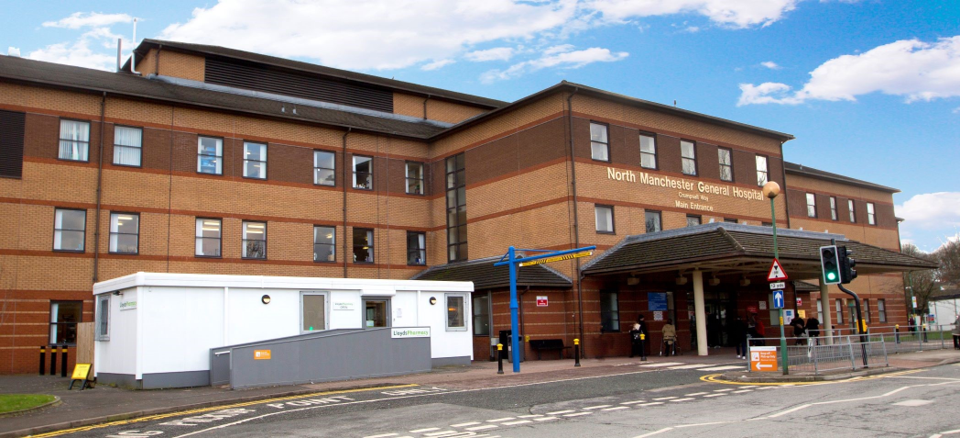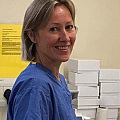Three North Manchester General Hospital (NMGH) nursing teams have now joined Research and Innovation (R&I) at MFT: Cancer and Core, Diabetes and Respiratory and Infectious Diseases. In the first in a three-part R&I blog series, Gabriella Lindergard PhD, introduces herself, her role and the NMGH Infectious Diseases Team.
Gabriella Lindergard
Hello, my name Gabriella Lindergard and I am a Research Nurse Manager within the NMGH Infectious Diseases (ID) Team, where I work closely alongside fellow Research Nurse Manager, Valerie George.
I started at the Infectious Diseases Research department almost eight years ago now, as a Senior Clinical Research Nurse. I can remember how exciting it was to be in a place where this final bit of research with real patients took place, before the ultimate decision about whether a drug or device was deemed safe to release into society.
After previously spending 12 years in basic academic research, where patient samples were rare and in great demand, I was now in a place where it all happened! The phrase ‘from bench to bedside’ was a reality here. During my years in the lab, I often thought that there must be a place where I could combine my nursing degree with my scientific experience to the benefit of patients. So, when a job as a research nurse came up in 2015, I was ready to apply.
The NMGH Infectious Diseases department was, and is, very research-active – often with around 30 studies ongoing at any one time in all areas of infection.
These areas including HIV, Hepatitis C, Hepatitis B, Tuberculosis (TB), Clostridium difficile (C.diff) and wound infection; with a combination of commercial studies, sponsored by pharmaceutical companies and academic studies, sponsored by universities. We deliver a mix of observational and interventional studies, trying to maintain a balanced portfolio of labour-intensive new drug trials (involving lower number of participants), alongside more general and less complex studies (involving large numbers of participants). This approach has been challenging but has worked out well. For instance, we may deliver a Hepatitis B vaccine study, which has a small number of recruits, alongside a larger-scale study, testing a novel HIV screening tool.
It was amazing to be part of the last trials before an effective and tolerable treatment for Hepatitis C was approved, and now used all over the world. Similarly, when I was an infectious diseases nurse in the 1980s, there was no hope for HIV-affected people, and diagnosis was a death sentence. Now, with new drugs available, carrying the HIV virus does not impact much on life expectancy at all.
Working in research during COVID-19
The past year has, of course, impacted us all massively. When the pandemic hit in March last year, we had to quickly limit all of our ID studies, as much as was safe, and completely re-focus on COVID-19.
We were a small team and, with some people required to shield or isolate, it quickly became apparent that we needed to completely change the way we worked to be able to respond to the urgent need to find some kind of treatment for the disease. The call was made to the other research teams at NMGH and, with the Diabetes and Respiratory Team running to our aid, we formed the new NMGH COVID Research Team, which was then joined by members of the Cancer and Core Research Team. Soon after, we also received help from some amazing colleagues from Salford Royal Hospital – people who we had never met before, but now consider lifelong friends.
I think everyone would agree that it was a challenging, fast-paced time when we set up eight COVID-19 trials in the space of six weeks, of which six were new treatment trials. We genuinely felt we were in race against time to recruit as many patients as we could to be able to offer a chance of treatment, at a time when NHS standard of care did not include any drugs. In the past year, we have recruited close to 500 patients to 14 different COVID-19 trials, plus a further 1,350 patients to Public Health England data collection. Some of these treatments have proven to reduce mortality and hospital stay and led to changes of recommended standard of care.
The teamwork has been absolutely amazing. We could not have kept going without the feeling of support, warmth and solidarity that developed when faced with so much change and challenge, in a very surreal and high-pressure working environment, with long hours and little respite.
We discovered skills and talents that complemented the team and, with constant support from our research doctors who were always there when we needed them, I think we have all come out with the feeling that most things can be done if you try.
Another very positive outcome has been building a great relationship with clinical ward staff. Their awareness of the value of clinical research has grown with our increased interaction, and we now work together on many levels, with them highlighting possible research participants, helping with blood collections and drug administrations, and talking to patients about research.
Now we have officially joined the MFT family, we will embrace the change with an open mind. We are looking forward to learning from each other and meeting new colleagues, maybe even face-to-face one day!





